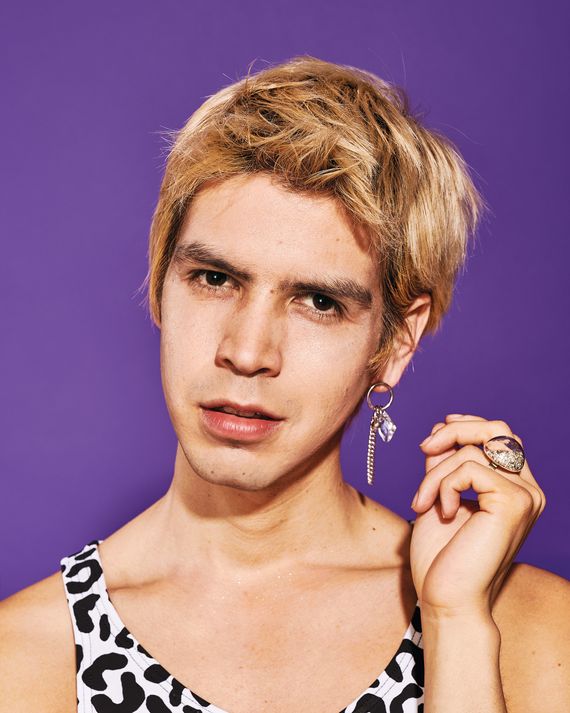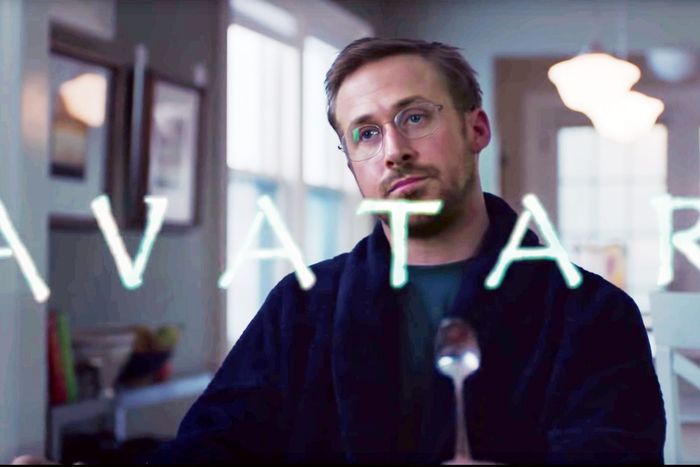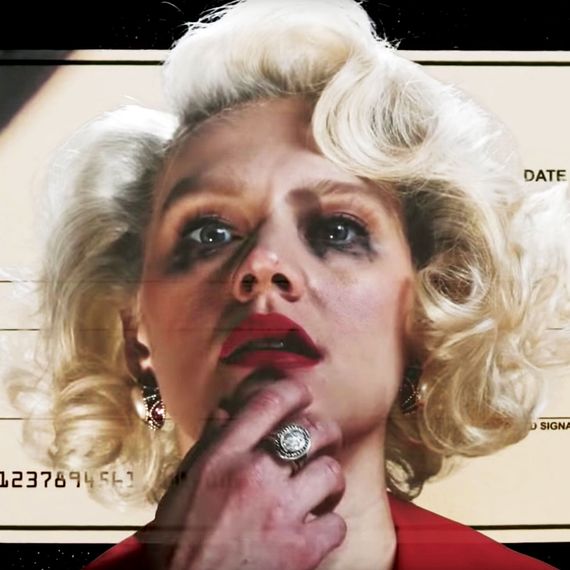
Shiny, sage-green shards of porcelain peek out from beneath a potted philodendron. Julio Torres, the co-creator of two new HBO comedy shows and the writer behind Saturday Night Live’s most delightfully melodramatic digital shorts over the past two and a half years (see “Wells for Boys,” a fake ad for a Fisher-Price play set for sensitive lads to whisper their secrets into), hasn’t cleaned it up, it seems, out of respect for the life and death of the now-shattered vase it once was. He tells me he’s still in mourning. He picks up another, pale-blue vase that was once the broken item’s constant companion in his exquisitely decorated Clinton Hill apartment. “This vase was the other one’s little friend,” he says. It is intact and beautifully sculpted, resembling a shell that a sea god might use as a horn. “I love this implied murder scene,” he says, apparently utterly sincere. “It just tells such a story that I was like, ‘It’s part of the décor now.’ ” You see a mess. Torres sees a vase-on-vase crime of passion.
The truth is that Torres was playing with a toy golf cart (as he often does) and accidentally bumped it into one of his many strangely shaped modernist statement lamps (I counted at least six), which knocked the green vase onto the floor. But the telenovela version is so much more fun.
Spend enough time with the writer-comedian — who comes across in person like a dreamy fashion student and goes by the apt handle @spaceprincejulio on Instagram — and it makes sense that he imagines his apartment to be a macabre version of Toy Story in which the dominant decorative objects terrorize the weaker ones. “He feels like he comes from another world,” says Ana Fabrega, a collaborator who, along with Torres and Fred Armisen, co-created the new HBO comedy series Los Espookys, which debuts June 14. “When you see his work, it really does feel like he doesn’t belong here and he’s giving his observations on us.”
And in a way, it’s true. Torres, now 32, immigrated to New York from El Salvador a decade ago. On the lazy Sunday we meet, he has bleached hair and colorful lounge pants a costume-designer friend made with fabric that Torres picked out and that looks like it’s covered in lips drawn by Picasso. His furnishings are generally clear or shiny, which he often says are his two favorite colors. Strewn across his white-and-silver dining-room table are swaths of blue cloth in all shades, textures, and levels of iridescence. He’ll be sending them to his mother, Tita de Torres, to bring to her tailor in San Salvador and have them turned into little tank tops and “robes as outerwear,” which he sketches whenever he gets stressed about writing.
I’m visiting on Clothes Organizing Day, and the contents of Torres’s closet and drawers are on his bed. He tells me he gets rid of things but also that he can’t stop buying lamps or acquiring delicate objects that he often breaks. He can’t help himself when it comes to beautiful things. “I would be the guard at the gate who looked at the Trojan horse and said, ‘Let it in!’” he joked at a recent stand-up gig at the Brooklyn queer comedy night “Open Flame,” where, for some reason, he clutched the mic stand with both hands so it hovered six inches off the floor during his entire set. “Can you earnestly say that if someone showed up to your apartment with a big fucking beautiful horse, you wouldn’t just let it in? And it’s free? And it comes with wheels?”
Torres is an aesthete, and his comedy is born in part from his highly attuned sensitivities. He can pull off a snow-leopard-print tank, which is itself unusual in the world of comedy, where performers often go onstage looking like they confused their laundry hamper with their closet. But it goes deeper than that: What might seem like mere style to the rest of us has more profound meaning to him. Take, for example, the fact that Torres, who is a brunet, dyes his hair to match his mood. Blond Julio is for when he’s having success and feeling playful. He’s having more fun! Dark-haired Julio is for when serious times require a serious look, like in 2012, when he was struggling to get a work visa to stay in the country. Or a couple of years ago, when he found out that a mole he’d ignored for a decade was precancerous melanoma. “I was so scared that summer I dyed my hair black,” he says, “because I thought, I need to go back to the colorless, resistant warrior I was when I dealt with this immigration stuff.”
Later this summer, he will have his own version of an HBO stand-up special, called My Favorite Shapes by Julio Torres, in which a series of objects come onstage via conveyor belt and Torres narrates their inner lives. (His mother and his sister Marta designed the backdrop of graphic shapes as well as the clear-and-white shoes he wears.) Torres “cast” it from his apartmentscape; people often hand him objects at his live shows. As we walk around, we find dried-out cacti, a jewel named Jessica whom Torres says works in PR (“She begins and ends every email with ‘ASAP.’ That’s her thing”), and a glass unicorn figurine that also met with a horrible accident. Torres keeps it because there’s something beautiful about a decapitated mythical beast. “So many little murders,” he says, smiling. “A lot of death in this apartment. A lot of death.”


Among Torres’s best SNL sketches is a series called “Melania Moments” depicting the First Lady’s inner thoughts as she stares out of Trump Tower and wonders about the texture of sand or senses her “replacement” being born in Latvia. The standout might be a digital short in which a lonely Melania strikes up a friendship with Kumail Nanjiani’s Pakistani customer-service rep. Torres tells me he decided not to write these anymore after she wore an I don’t really care, do u? jacket on her way to visit detained immigrant children at the Texas-Mexico border. “There was a switch,” he says. “She started talking, and it was like, ‘Oh yeah, you’re not captive. You’re making choices.’ ”
His comedy doesn’t tend to be overtly political, but if you were to punch in all the characteristics most likely to get Donald Trump frothing at the mouth and then ask a computer to spit out a person, it might look a lot like Torres. He’s not just an immigrant from a Central American country beset with troubles from MS13; he’s defiantly queer, fantastically talented in an utterly original way, and embraced by Hollywood.
“His story is amazing. Who immigrates and becomes a comedian — and a successful one?” asks Armisen, who’s collaborating on both of Torres’s HBO shows. “It’s not like he’s a regular stand-up comedian, either; he’s not mainstream. So for him to think, Mmmm, this is going to work out for me, is really bananas.”
If audiences recognize Torres, it’s generally from the DIY Brooklyn comedy scene and digital sketches on YouTube, where he got his start, or from his frequent appearances as a stand-up and special correspondent on The Tonight Show (giving helpful Halloween costume suggestions like the Lost City of Atlantis, which is an actual costume Torres wore a few years ago.) He has none of the outré, “please like me” energy often required for women and gay comics to break through stand-up’s enduring bro culture. He delivers his routine as if he’d rather be whispering and takes long pauses like an introvert who lost a bet. He’s in the vein of ’70s absurdist comics such as Steve Martin, Andy Kaufman, and Robin Williams as Mork, or perhaps a gentler Pee-wee Herman. And he makes you see the world in his own enchanting way, as if he’d just played with a My Little Pony onstage and slowly got the whole room to join in.
Over the two and a half years he has been writing for SNL, Torres has managed, with zero on-camera appearances, to create an instantly recognizable voice. One of his early sketches is “Diego Calls His Mom,” featuring Lin-Manuel Miranda at a pay phone in North Dakota recounting, mostly in Spanish, the wonder of seeing his first marshmallow salad and a dreamy “friendship” spent running through cornfields with a young man in a letter jacket. Another, “The Actress,” follows Emma Stone as she digs deep to find the motivation of her character: the spurned wife in a gay porno. A third, “Papyrus,” features a very committed performance by Ryan Gosling as a man driven to madness with the knowledge that somewhere in the world there is a graphic designer who made money on the logo for the Avatar movies, which looks as if it were chosen randomly from a Microsoft Word drop-down menu. Gosling encouraged the sketch, which was based on a tweet of Torres’s that he’d loved: “Every day I wake up and remember that Avatar, a huge international blockbuster, used Papyrus font for their logo and no one stopped them.”
Fred Armisen in particular was paying attention. Every time he saw a sketch he liked on SNL, he’d text the producers to ask who wrote it, he says, “and most of the time it was Julio.” So when Armisen sold the idea for Los Espookys, HBO’s first primarily Spanish-language original series, he called up Torres and fellow Brooklyn alternative comic Fabrega to help write and star in it, along with two accomplished Mexican actors, Bernardo Velasco and Cassandra Ciangherotti, they found through casting. Los Espookys is a lighthearted look at a group of horror enthusiasts who start a business creating scary spectacles, such as a fake exorcism for an older priest who’s worried he’s losing ground to a younger rival with glossy lips, or a sea monster for the mayor of a town looking to boost tourism. Torres plays Andrés, a blue-haired count and the heir to a chocolate fortune.
“Andrés had to have blue hair,” Torres insists. “It was necessary.” Necessary enough that he had to bleach and dye his hair every two weeks for the entire three-month shoot in Santiago, Chile. He even stained his entire Airbnb blue. This was one of the first times he would be on a TV show playing a major character who isn’t Julio Torres, and he needed to make a differentiation as much for the audience as for himself. “I want people to think I’m acting,” he says. “And I’m not a very good actor, so I’ve got to make that happen some other way.”
“It’s the same reason I wear a hat the whole show,” his co-star Fabrega tries to explain. “It’s like, ‘That’s not me. I’m wearing a hat.’ ” In addition to co-writing the series with Torres, she plays Tati, the gang’s bumbling test dummy who’s always juggling odd jobs, like breaking in women’s shoes or spinning the blades of a fan when the electricity goes out.
Los Espookys began as a kind of fever dream Armisen had after visiting Mexico City. He’d been fascinated by the strength and prevalence of Goth culture and imagined setting a show there. “I thought, There’s a lot of monster stuff here. What if there are four people who are, like, in a band, but instead of music, they scare people?” he says. Making a comedy show in Spanish was something he’d wanted to do ever since the South Korean star Psy had a No. 1 rap hit in a foreign language with “Gangnam Style.” Couldn’t he will into existence a show set in the Latin world that wasn’t about culture clashes or gangs or immigration but just about weird people doing interesting things?
After HBO got interested, Armisen, Torres, and Fabrega holed up in L.A. and pounded out the pilot, then Torres and Fabrega took over writing duties for the rest of the series. “We were typing in English but thinking in Spanish, or at least I was,” says Torres. Though Los Espookys was meant to be about Mexico City, it was eventually shot in Chile and set in an unnamed fictional country, mainly because the cast had so many different accents.
The world of Los Espookys is, in Torres’s words, “this heightened, strange, dream-slash-nightmare-y, at times, version of Latin America.” It’s informed by his fractured recollection of growing up in El Salvador and Fabrega’s experiences in Panama, where her parents are from. “Specifically, I remember this news show on our Channel 4 where there would be, like, metaphysical alien-abduction news thrown in there with the real news,” says Torres. He also took inspiration from a Brazilian telenovela his mom used to watch that often had magical-realist plots, like a man falling in love with the moon. “Things just happen and you don’t question them,” he says.


Los Espookys is also, in many ways, more modern than most Spanish-language series the cast tells me they’ve seen. Torres is particularly proud to have written a gay couple onto the show, “which is not something I grew up around at all.” Not only that, it’s also a gay couple with “rich people problems,” though viewed through an Espookys lens. Andrés carries around a jewel that he uses like a magic mirror to spy on his power-hungry boyfriend Juan Carlos (played by Mexican soap actor José Pablo Minor). “That’s so funny to me, that Andrés is ‘woe is me’ to the extent that his main nemesis is his beautiful boyfriend,” says Torres. “They both despise each other with every fiber of their being.”
When Torres was about 3 years old, a palm reader told his grandmother that one of her grandchildren was going to be famous in New York. Torres had a lot of cousins, but as soon as his mother heard that, she knew it was him; after all, she had visited the city while pregnant with Julio. As a kid, he faithfully watched SNL, kept a big drawing of Manhattan in his room, and dreamed of moving there for college. He thought maybe he’d become an architect like his mom (and he still gets excited about preliminary meetings, when he gets to help design the look of the show). But he also had a gregarious side and loved to act in pieces he made up while his parents taped him.
“I feel like, truly, my life as a comedian has been looking at my life, taking out adolescence, dragging that to the garbage, and then moving back to childhood,” says Torres. “I’m constantly revisiting childhood through what I do. Coming up with stories, playing pretend, dressing up, projecting narratives onto objects or toys.” Growing up, he lived in a bubble of his own creation. He would make clothes for his Barbies; his mother would build cardboard houses for them designed to his specifications. In adulthood, this has translated into a recurring SNL sketch in which Mattel flunkies come up with terrible ideas for captioning Barbie’s Instagram — which is a real account that Torres has long followed and been fascinated by.
He wanted to leave for New York (and his preordained fame), but he couldn’t afford the New School the first time he applied. So he spent two years in advertising school and then another year working in a firm, sitting at a computer, coming up with ideas for products that no one made. He applied for the New School again and got a scholarship to study English and creative writing and has never regretted the move.
Not until he became Bushwick roommates with the nonbinary performer Spike Einbinder did Torres start toying with comedy. They made a series of YouTube videos together starring Einbinder. (The one to watch is 2013’s “Mermaid Intern,” a tale of a fish out of water that gets an office job.) Torres didn’t think he was going to do stand-up until the moment before he tried it. “Stand-up was just an easy, free, independent way of showcasing my writing.” Also it allowed him an outlet for his creativity when Einbinder was too busy to make a video. “I literally Googled ‘New York comedy open mic,’ ” he says.
His first set was about his job working in the coat-check room at the Neue Galerie. “My observation was that I was shocked to see that people on the Upper East Side actually behave and speak just like New Yorker cartoons,” he says. “There was one woman who, as she was handing me the coat, she turns to her friend and says, ‘Remind me to send you that article on standing and how good it is for you.’ It was almost like they were discovering the benefits of standing up. In front of someone whose job was standing up all day.”
There wasn’t a queer or “diverse” comedy scene, but Torres found other comedians with a certain sensibility and they started doing shows together in DIY venues deep in Bushwick. He’d just graduated from the New School, which put an expiration date on his student visa, leaving him with “the looming dark cloud of having to get a work visa to stay here, which is very expensive,” he says. It was so stressful he restricted himself to wearing only black and white because he couldn’t afford distractions. His friends gathered for a YouTube video called “Legalize Julio,” in which they made plaintive pleas to help raise $5,000; some money they promised would go to legal fees and the rest to things like water trampolines and fake diamonds for Torres to sweetly slip into people’s pockets. Finally, he landed a job as an art archivist, transcribing handwritten letters.
In the middle of all this, he heard of a stand-up industry showcase NBC has for young comics. After Torres made it to the round of finalists who get flown out to L.A., a manager for 3 Arts Entertainment asked to meet him. “I remember thinking she was going to offer me a job, like, making coffees and stuff, and being very excited about the possibility,” he says. He gradually realized she actually wanted to be his talent rep. The first thing he told her was that he needed a visa. She helped him stay on as an artist.
Money, though, remained an issue. “I didn’t start making okay money until comedy started taking off,” he says. “Before that it was truly, yeah, just trying to figure it out day by day.” Even though he graduated from the New School with no debt, he still doesn’t have a credit card and hopes he never will. Not only has his family had trouble with loans, he also doesn’t believe in the credit system. “I don’t want to be like, ‘Oh, so these corporations have screwed over so many people, but it’s a game you’ve got to play.’ I hate that,” he says. But then, he says, “Every time I move it’s like, ‘Oh God, I have to tell the realtor I have no credit because I don’t believe in the system!’”
SNL rejected Torres the first time he interviewed, but he was eventually asked to be a guest writer on the last three episodes of summer 2016. That led to his getting hired for the next season, when he found creative partners in writers Jeremy Beiler (with whom he wrote “Wells for Boys”) and Bowen Yang, along with Dave McCary, who directed most of his shorts and My Favorite Shapes.
The show has been extremely receptive to his most off-the-wall ideas, but one he has pitched numerous times still hasn’t stuck. “It’s called ‘Tiny Little Stairs,’ ” he says. “It’s an infomercial for a product that helps with headaches and nightmares and waking up groggy, and it’s just stairs a couple of inches tall that you put next to your ear at night so your dreams can come out and dance.”
All things considered, life seems to be good. Blond Julio is winning, though Torres is never quite sure for how long. “It feels like I’m building this tower of cards,” he says, “and then I don’t know, I don’t know, I don’t know — there might be a breeze!”
*A version of this article appears in the June 10, 2019, issue of New York Magazine. Subscribe Now!

